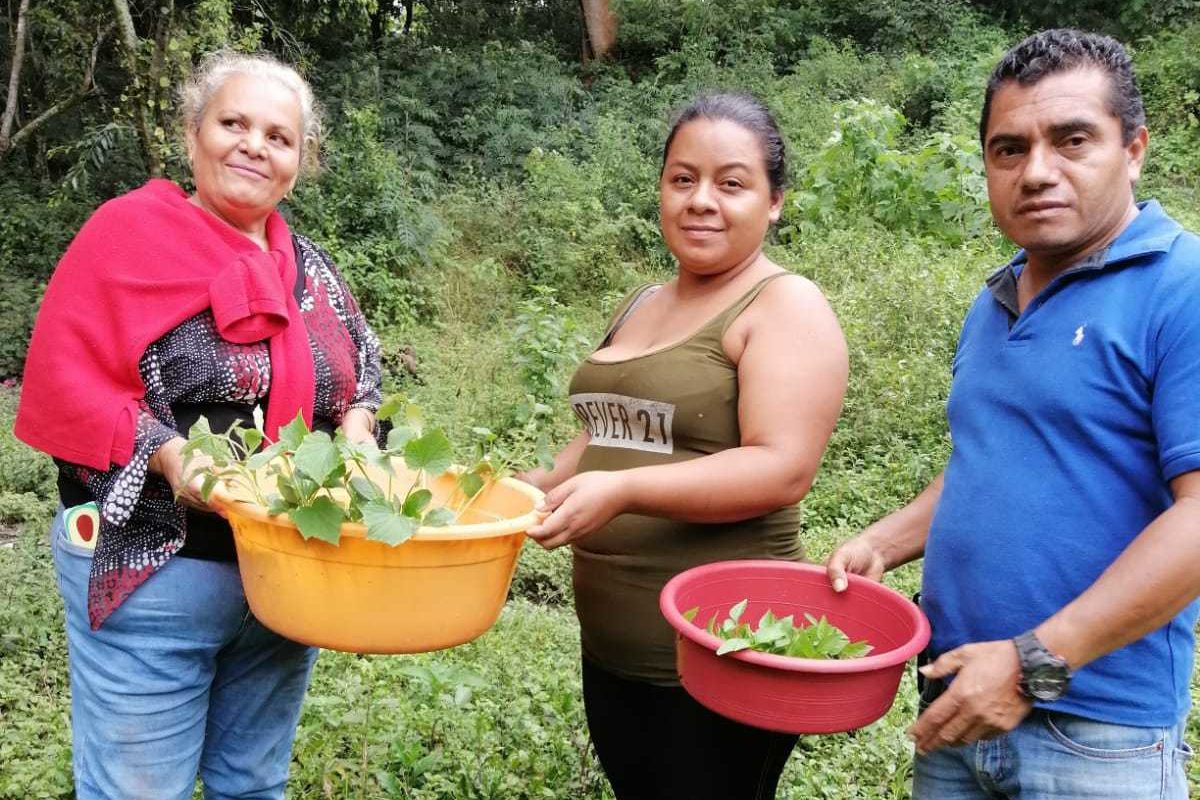
The Mary’s Pence ESPERA team members regularly meet with our partners to understand the needs and priorities of the local women’s organizations. Conversations in these meetings uncovered food insecurity issues that worsened during the pandemic – and a new focus on family farming emerged.
In El Salvador the typical diet is based mostly on basic grains such as corn and beans, with less emphasis on vegetables, fruits, dairy products, meat and fish. Through this initiative not only are women producing more food, they are learning to grow things organically and diversify their crops, adding many more vegetables.
ACOMEST – One Experience in El Salvador
Asociación de Mujeres de Tonacatepeque (ACOMEST) is ESPERA’s partner organization in Tonacatepeque, El Salvador. During the pandemic when access to markets became an issue, ACOMEST helped women start family gardens – plots of land next to the house where vegetables are grown intensively and continuously throughout the year.
The initial request to Mary’s Pence was for funding to buy seeds and seedlings, as these are very expensive. With the help of Mary’s Pence, ACOMEST was able to help women start planting chili peppers, tomatoes and cucumbers. ACOMEST was able to support 30 women, which impacted their families, with an estimated reach of 200 people. The funding allowed delivery of 5,000 tomato, cucumber and chili plants to 7 communities that are part of Tonacatepeque. Of the 7 communities, 6 had success. As always, things are difficult in Central America. The 7th community was using land that was borrowed, and it was a distance from the community. This made it hard to monitor; some of the crops were attacked by fungi and others were stolen.
As part of the project ACOMEST offered technique advice. One thing the women learned was how to retain tomato seeds for the next cycle of planting, rather than continuing to buy new seeds.
The focus on growing their own organic food is providing better nutrition for the women and their families.
They used the crops for their family dinner table, as well as to make some extra income with the extra produce.
ACOMEST will receive additional funding to replicate and expand the project this coming growing season.
Mary’s Pence Funding More Food Sovereignty Projects
Several other ESPERA partner organizations are also receiving funds to expand family farming.
La Asociación Coordinadora Salvadoreña de Pequeños Productores Organizados (CESPPO) in Santa Tecla, El Salvador will be receiving funding for organic gardening.
In Tecoluca, El Salvador, ASMUR received funding last year, and 90 women received tomato, chili, cilantro and cucumber plants for home gardening. About 60 women had strong interest and followed through on raising their crops. In the coming season ASMUR will expand the technical assistance that they can provide the women, and one of their companera’s was accepted into a training program on agriculture.
The Concertation de Mujeres de Suchitoto (Concerta) in El Salvador has submitted a 3 year proposal to support women producing food, with a focus on organic farming.
Components of the program include improving production, helping growers to reach local markets, and educating the community on the benefits of organic food.
This was the first time Mary’s Pence received such an ambitious proposal from the Concerta – we were happy to see a multi-year request that included fully funding a staff person – this will increase sustainability of the project.
Family agriculture strengthens and promotes the local women’s organizations, and enhances the social and economic well-being of the community. With the help of Mary’s Pence our ESPERA partners are able to expand the support and expertise they could provide for their members, thereby improving food security, and making a healthy diet accessible to all.
